'One more festa': Fall River's Holy Ghost feast marks the glory of all things Portuguese
FALL RIVER — Under the twin spires of St. Anne’s Church, thousands of people are drawn together by faith and family.
It’s Thursday evening, the second night of the Great Feast of the Holy Ghost of New England, a five-day celebration of the Azorean culture that sees tens of thousands of people flock to Fall River to reunite with loved ones.
In 1958, then-Sen. John F. Kennedy’s Azorean Refugee Act kicked off the second great wave of Portuguese immigration to America, one that irreversibly changed Fall River. On South Main Street, a charter bus pulls up along the park named in Kennedy’s honor. Out come visitors who’ve made a long journey to Fall River for the festa, dressed formally for travel, carrying just enough luggage for the next few days — they’re greeted by family at the park with long embraces and kisses European-style: one on each cheek.
What to know before you go: Great Feast of the Holy Ghost at Fall River's Kennedy Park
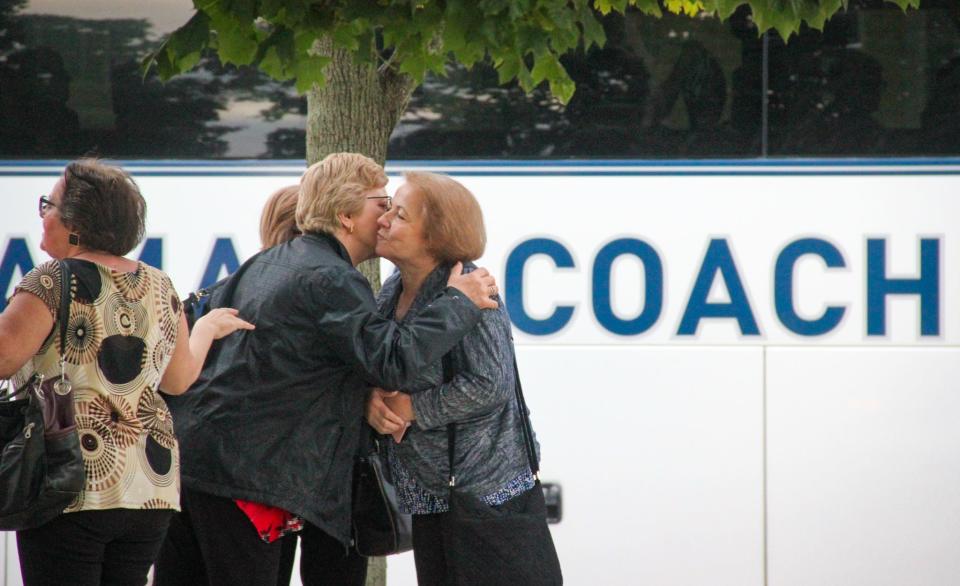
Charter bus trips like this from Canada are common during festa season; Azorean immigrants of that generation settled there, too, and festa time is a perfect excuse for a reunion.
A little farther up South Main Street by The Clipper, another bus has visitors disembarking. Nearby, a car with Ontario license plates is circling a block, perhaps looking for a scarce parking space. Elsewhere, in Kennedy Park by a merch table, someone says he knows a woman whose son is arriving from Canada tonight, so she won’t be at the festa — “she has to make sure the house is ready for company.” Near the corner of Bradford Avenue, two parents and a young tween-age daughter walk through the grass, and the dad stretches a hand to indicate the food tents, the merchandise tables, the music stage, the lit Holy Ghost crown. He says: “They come from Canada, from Portugal, from all over the country.”
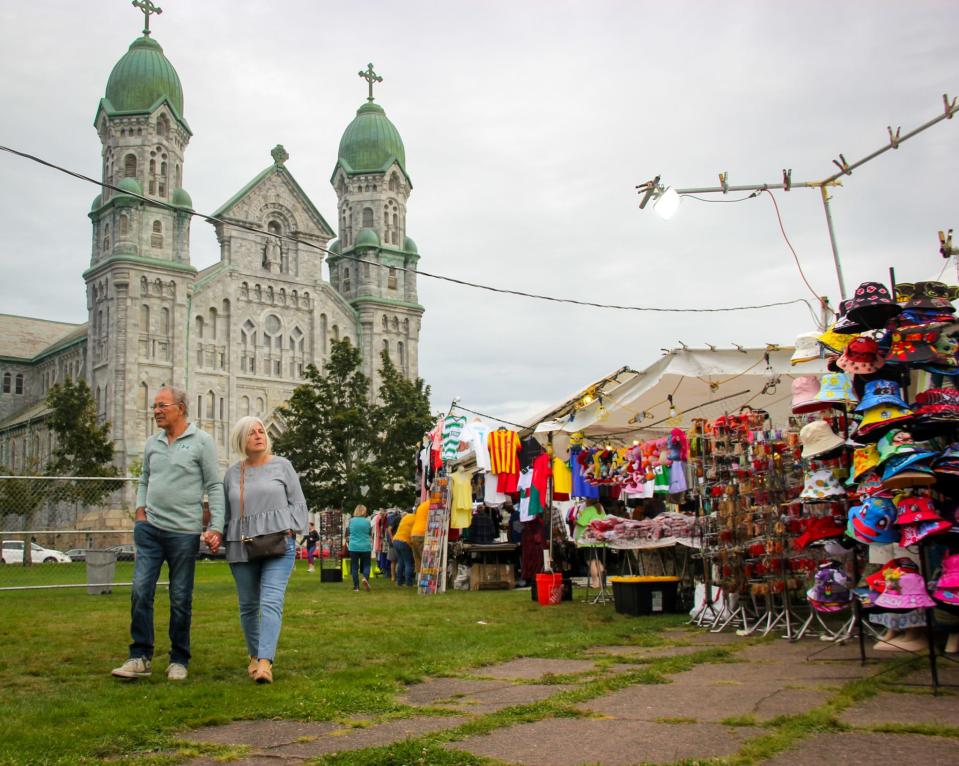
Southcoast Wonders: How Holy Ghost feasts began, and why they have 'queens'
At Fall River's Holy Ghost feast it's always time to eat
It’s dinner time. The food lines are dozens-deep, extending far outside the food tent to the base of the Holy Ghost crown. The crown is a symbol of the feast that goes back to the 13th century and Queen Isabel, or Elizabeth, topped with a dove, representing the Holy Spirit.
Even if it weren’t dinner time, the lines would be this long — it’s called a “feast” after all. The festa is time for indulging: bifanas, ca?oila, chouri?o and peppers, sandwiches of spicy, succulent meat on crusty papo seco rolls. The line moves steadily but slowly. Behind the scenes, a crew of volunteers are in constant motion, making sandwiches, stirring pots, salting fries, wrapping food, setting it on paper plates.
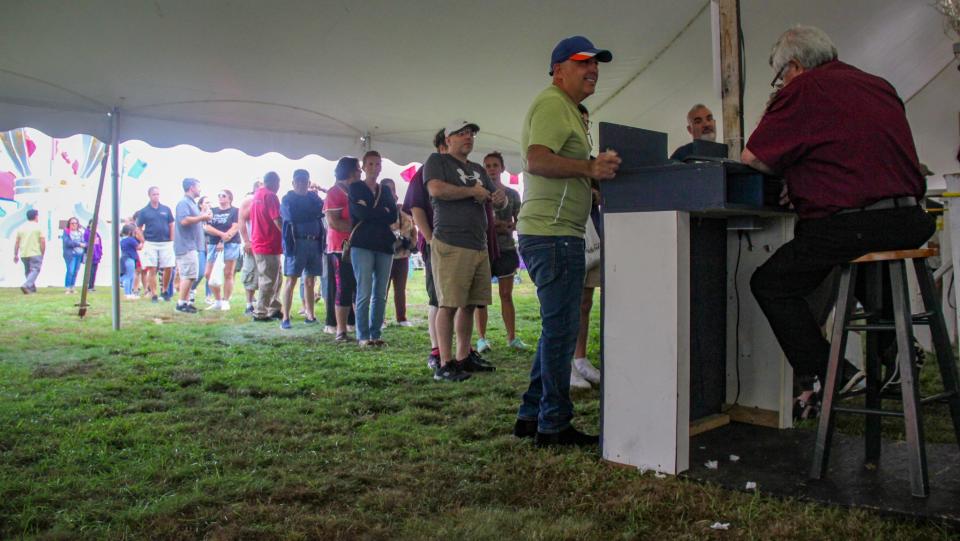
Under the food tent, a young Fall River police officer takes a group photo for a family of people holding their food, and hands their phone back to them with a smile. Just outside the tent, a couple sitting on the grass by the stage unwraps bifanas from aluminum foil and washes them down with cans of Sumol, the Portuguese soda.
Many others have skipped the main course and gone right for dessert. An older woman with four young girls circling her like satellites walks out of the food tent carrying bags of food and heads toward the ice cream truck — she tells the girls they should be eating their food before they get ice cream, but she waits in line with them anyway.
Lawn shrines: Why do Fall River area homes have Virgin Mary statues in bathtubs?
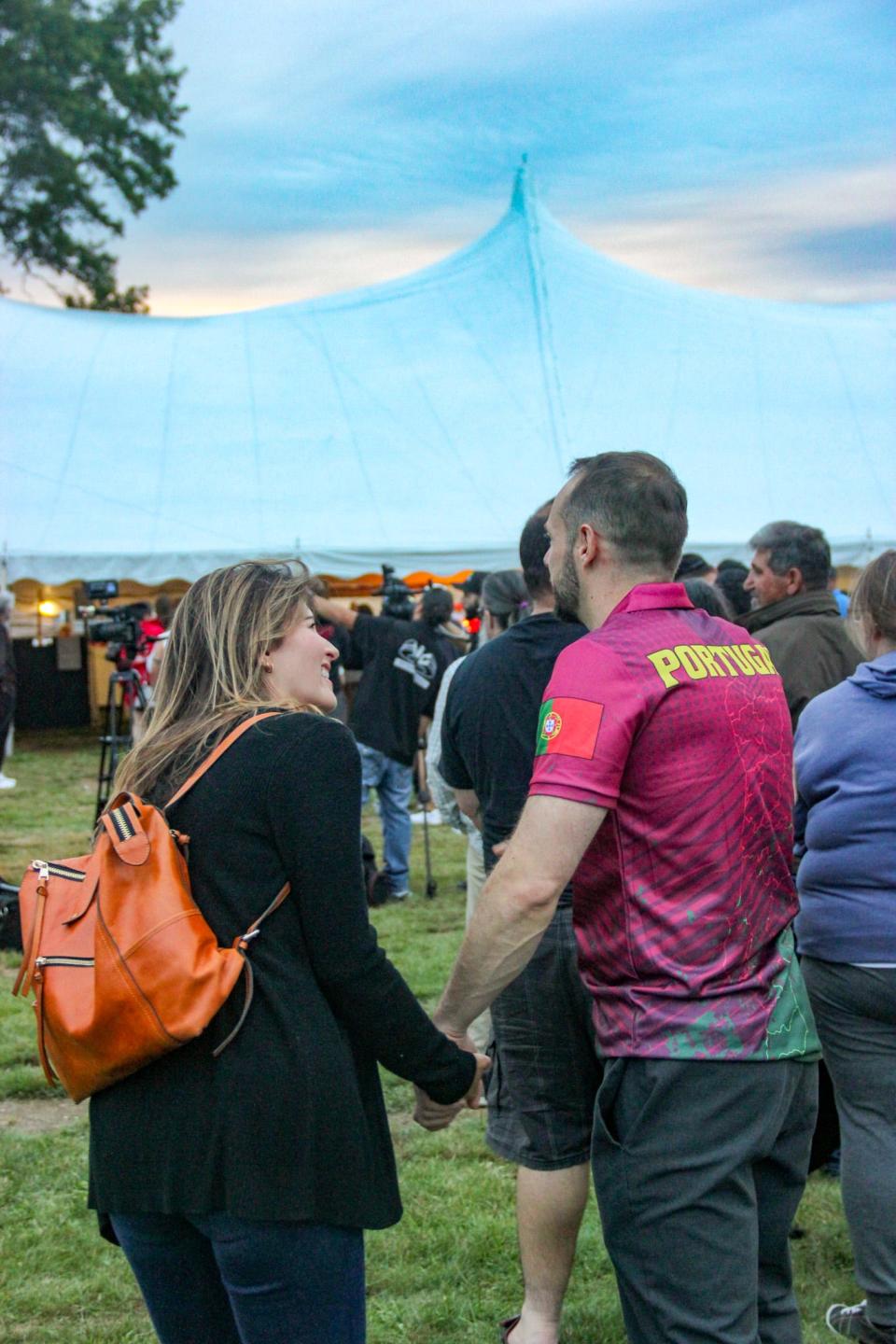
At the front of the line, kids unwrap bomb pops and SpongeBob popsicles, sometimes to be eaten down to the stick and sometimes to be nibbled at and abandoned in favor of running around in aimless circles on the grass, just thrilled to be outside and free. Elsewhere in the park, a mom squats down to meet her tiny daughter’s gaze and asks “Queres pipocas?” — do you want popcorn?
And everywhere you look, someone somewhere is holding a malassada. The baseball-mitt-sized slabs of sugar-coated fried dough are a must. They’re for all ages. A middle-aged man says to another: “You never had one? Oh, you’re in for a treat. They make them fresh, that’s why they’re nice and warm.”
On a set of bleachers along South Main Street, a young woman makes an interesting discovery — she'd accidentally spilled salt on her malassada and ate it anyway. “It’s actually really good,” she says. A young man with her considers this. “So, sweet and savory,” he says. “That makes sense. Like a peanut M&M or a chocolate-covered pretzel.”
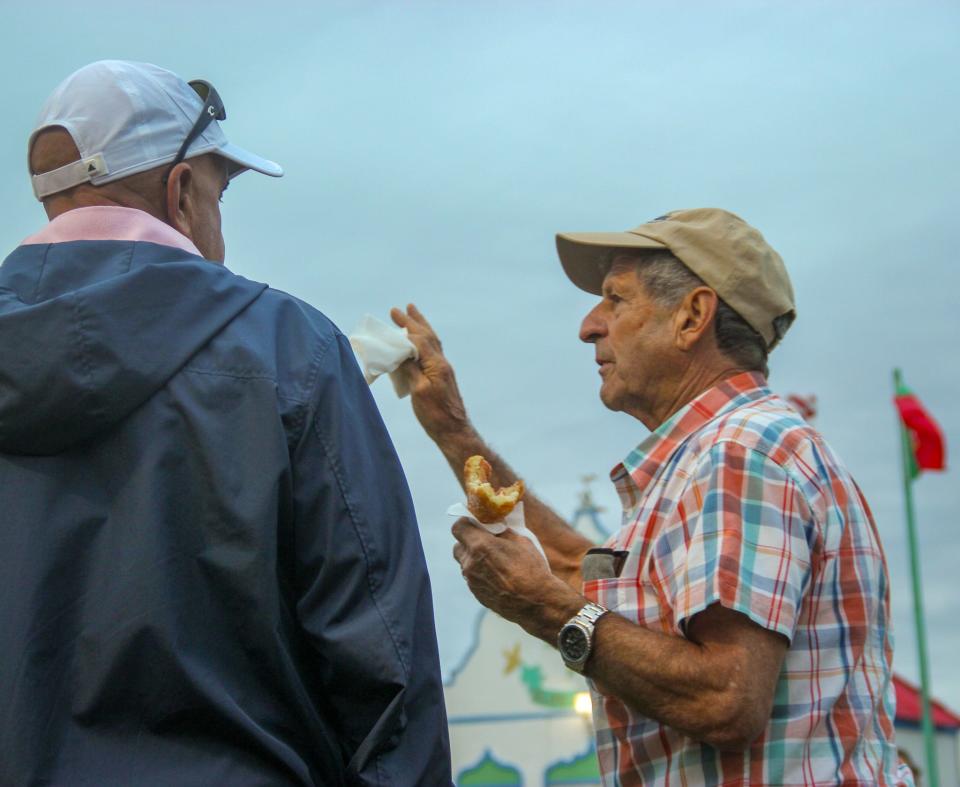
Love of language: Portuguese-American woman launches children’s books to encourage learning Portuguese
The Holy Ghost feast is a celebration of Portuguese heritage
The festa is a place to see and be seen. A couple waits in line for malassadas wearing matching Portugal soccer jerseys. Another man has the Portuguese coat of arms tattooed on his right calf.
Merch tables here sell all kinds of things: belts and leather goods, dresses, blouses, hats, sunglasses, gold jewelry, stuffed animals, CDs, flags of Portugal, Brazil, the Azores and Madeira, soccer gear for every Portuguese and Brazilian team. Other booths have religious icons — crowns, crafts made with intricate beadwork, statues of Our Lady of Fatima, images of the Holy Spirit.
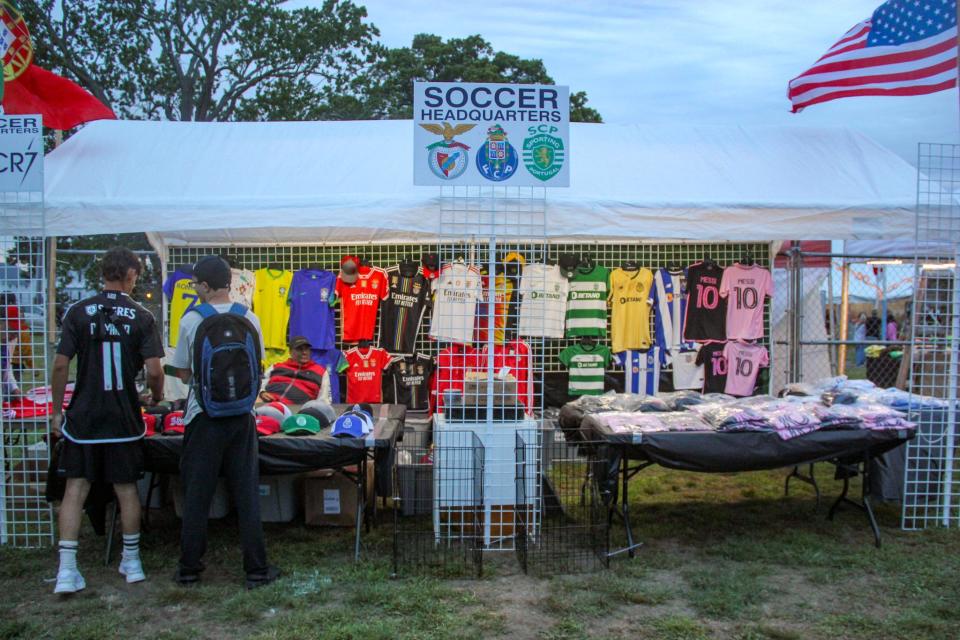
At the bazaar’s prize booth, people buy paper twists by the handful and unscroll them looking for a number matching a prize on the display table, things like mugs, paintings, ceramic figurines, sachets of soap. By 7 p.m., the ground is littered with scraps of white paper, and many of the prizes are gone — some lucky person has taken home an image of Jesus displaying his sacred heart, printed on a slab of varnished wood.
“Winner winner, chicken dinner,” someone says. A person has won a small woven basket made of glass, another has a Holy Ghost icon. Another person’s arms are laden with prizes, and he’s using a painting as a shelf to hold them all; a young girl adds to his stack a ceramic urn.
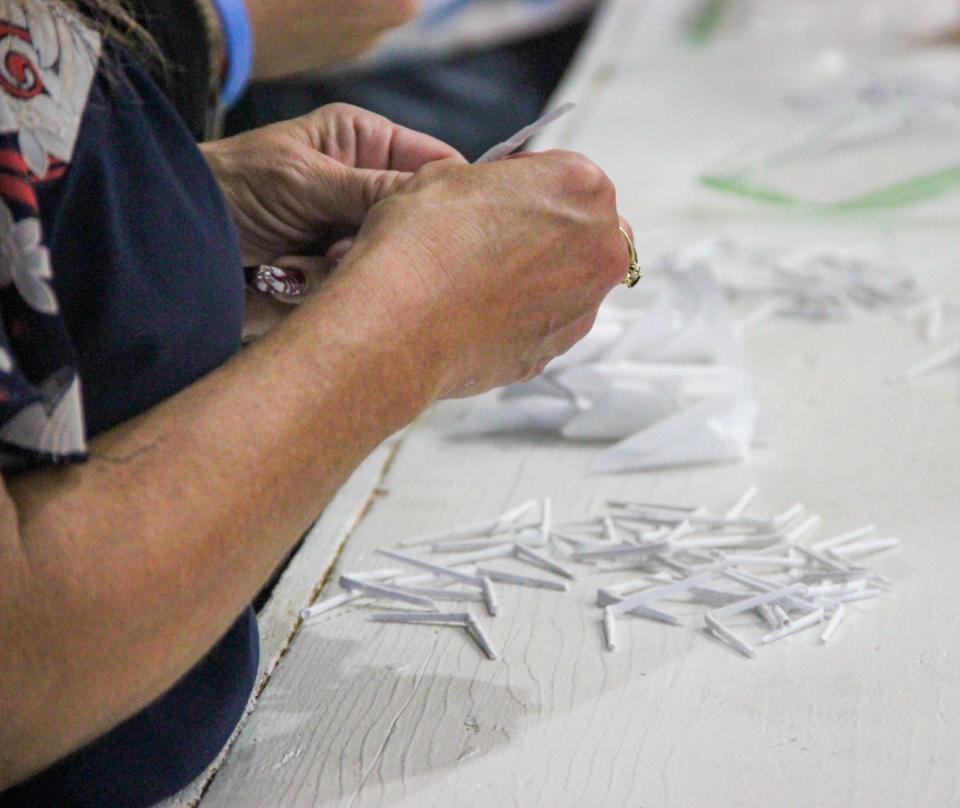
The live entertainment starts as night falls — on Thursday, the singers are almost all the children of Portuguese artists carrying on the tradition: Liz and Jordan, children of singer Jorge Ferreira, Dimanne, daughter of singer Marc Dennis, many others.
Dennis is the master of ceremonies. He mixes Portuguese and English casually in a way familiar to most people of Azorean heritage. “Temos aqui uma boa noite," he says, saying it’s a great night. "Nos temos toda qualidade de musica incluída country music, rock music, rap music, Portuguese music, so sit back and enjoy.”

Dennis is casually morbid in a way many Azorean people may be familiar with, too.
“Welcome to one more night, one more year, one more festa," he says. "We're still alive.”
Dan Medeiros can be reached at [email protected]. Support local journalism by purchasing a digital or print subscription to The Herald News today.
This article originally appeared on The Herald News: Fall River marks day 2 of Portuguese Great Feast of the Holy Ghost
